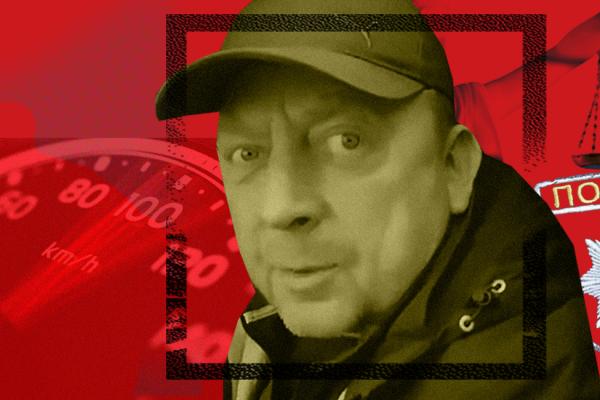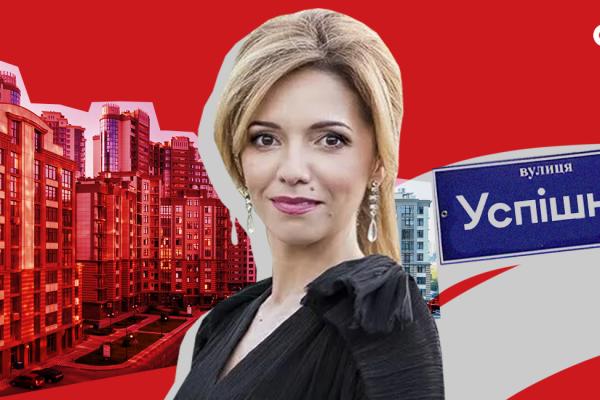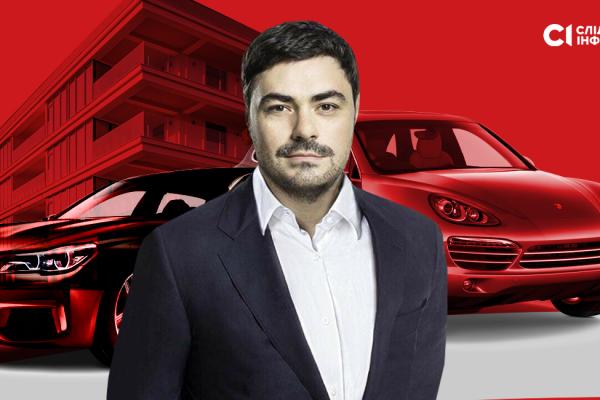Kharkiv businessman Oleksandr Romanenko paid 20 million rubles ($218,000) to the state budget of the aggressor state after Russia’s full-scale invasion of Ukraine. Romanenko pleaded guilty, and the court fined him 170,000 hryvnias ($4,411) for his crimes. The entrepreneur is a business partner of the current Kharkiv City Council member Oleksandr Vasylenko.
Slidstvo.info lays out the circumstances of this case and how the Kharkiv City Council member is embroiled in this scandal. The video has English subtitles.
COOPERATION WITH RUSSIA
The Holosiyivskyi District Court of Kyiv recently published a verdict finding Oleksandr Romanenko guilty of doing business in Russia during the full-scale war and paying 20 million rubles in taxes to the aggressor state ($218,000).
For this crime, the court sentenced the businessman to a fine of 170,000 hryvnias ($4,411) and deprived him of the right to hold certain positions, including in government bodies, for a period of 10 years. However, he will be able to run for local government. The court commuted the sentence because Romanenko is actively involved in volunteer work.
“Person 1 (Oleksandr Romanenko – ed.) is an active volunteer and at appropriate times, the local community can entrust him with the performance of representative functions on the ground, given the measures he takes to support and help the affected citizens of Kharkiv and the surrounding area,” the court said in its verdict.
Oleksandr Romanenko is a Kharkiv-based businessman and founder of the Russian company Frunze Plant LLC. This company is registered in Belgorod and trades in automotive parts, perforated metal products, furniture, and timber.

Oleksandr Romanenko
As stated in the court’s verdict, in August 2022, Frunze Plant entered into a supply agreement with the Russian joint-stock company Krasnodar RTI Plant and received 288,000 Russian rubles ($4,728) for the goods delivered.
The Krasnodar RTI Plant itself cooperates with Russian strategic plants that build railroad wagons in Russia. These railroad wagons are used by Russians to transport stolen Ukrainian grain. The company also manufactures grain harvesters, which Russia kindly provides to the occupied territories.
In July and September 2022, after the horrific shelling of the Kharkiv neighborhood of Saltivka, thousands of casualties, and repressions in the occupied part of Kharkiv Oblast, the Kharkiv-based businessman Romanenko cooperated with a number of companies in Russia and occupied Crimea. The company itself had branches in the cities of Belgorod, Voronezh, Yekaterinburg, Kazan, Krasnodar, Moscow, Rostov-on-Don, Samara, Chelyabinsk, as well as in the temporarily occupied city of Simferopol in the Autonomous Republic of Crimea.
In total, since February 24, 2024, Romanenko has paid more than 20 million rubles ($218,000) to the Russian budget.
TIES WITH A LOCAL COUNCILOR
When searching for Romanenko’s photos, only one photo of him appears online, published on a Russian website. He has no social media pages that can be found by his name, and there is no mention of his volunteer activities. Slidstvo.info journalists tried to contact the businessman to ask him about his volunteer activities in Ukraine and his work in Russia.
None of Romanenko’s phones, which were at the disposal of the editorial office, answered. However, his wife Liudmyla eventually picked up the phone.

Liudmyla Romanenko
His wife confirmed that Romanenko did have a branch in Russia, but had not flown there since 2021.
“They had a branch there, but there was no plant there. He hasn’t flown there since the COVID times,” said Liudmyla Romanenko, wife of Oleksandr Romanenko.
Oleksandr Romanenko never contacted the journalists.
It turns out Romanenko is more than just an entrepreneur from Kharkiv, as it might seem at first glance. He shares ownership of a business with Oleksandr Vasylenko, a member of the Kharkiv City Council.

Oleksandr Vasylenko / Source: forum.technopolygon
According to the YouControl open data platform, Romanenko is one of the largest shareholders in the Ukrainian namesake, Frunze Plant. Councilor Oleksandr Vasylenko has a controlling stake, which allows him to make almost all decisions alone. The two also jointly own the company Frunze Solar LLC, which produces electricity and is part of the “Frunze group of companies”, owned by the Vasylenko family. The main activities of the group’s companies are the production of metal products, trade and repair of motor vehicles, and electricity generation.
The description of the Ukrainian company’s activities is the same as that of the Russian company. The “Russian branch” that Romanenko’s wife refers to is most likely the Russian business for which Romanenko was sentenced.
In Ukraine, the Frunze trademark was registered by Vasylenko’s joint-stock company. The Russian company uses the same emblem, and the Russian website’s “About us” section refers to the Ukrainian Frunze Plant’s YouTube channel, where Vasylenko personally advertises his own products.
On Vasylenko’s personal Facebook page, in the “place of work” section, there is a link to the Russian Frunze Plant page. Vasylenko himself was once a co-founder of a company in Russia that was part of the “Frunze group of companies.” He owned it together with Romanenko.

Ownership structure of the Russian company
That is, the Frunze Plant group of companies is also the business of local official Vasylenko, not just businessman Romanenko.
In Ukraine, PJSC Frunze Plant takes on government contracts. It supplies police cars, provides wires to state-owned companies, and supplies metal fences to military units.
But in Russia, Frunze Plant LLC also took on government contracts. It supplied benches for a Russian bus station, nets for a Russian airport, and metal products for Stavropolgaz. These tenders were held after 2014 when the annexation of Crimea took place and the fighting in Donetsk and Luhansk oblasts began.
But the most interesting thing is that the Ukrainian company and its de facto Russian subsidiary, which appears to have been registered to operate in Russia, also continued to conduct business after the full-scale invasion.
In February 2023, Ukrainian PJSC Frunze Plant entered into an additional agreement with the Russian company Frunze Plant and even agreed with the National Bank to make a payment from Russia to Ukraine.
Oleksandr Vasylenko himself is a member of the Kharkiv City Council from the party KERNES BLOC – SUCCESSFUL KHARKIV! In 2015, he was elected to the city council from the Revival party, and in 2010 from the Party of Regions.

Oleksandr Vasylenko / Source: bezpeka.ua
Journalists of the Nashi Hroshi project reported previously that local official Vasylenko supplied a car for Kharkivenergozbut, a tender he won without competition. Vasylenko also entered into an agreement with the Saltivka Tram Depot for more than 11 million hryvnias ($285,433) without tender. All this happened in 2023.
Vasylenko is also accused of seizing a land plot of almost 9,000 square meters, and the case is currently being considered in court.
Slidstvo.info journalists received information from sources about Vasylenko’s flights from Moscow’s Vnukovo to Voronezh on April 15, 2015, and from Vnukovo to Belgorod on May 13, 2015.
By the way, back in 2015, the Voronezh branch of the Russian Frunze Plant had problems. The property of the Voronezh company was seized by raiders. Subsequently, this branch went bankrupt.
At the request of journalists, Oleksandr Vasylenko himself said that until 2022, his PJSC Frunze Plant supplied products to Russia, and the circumstances after 2022 are described in the case file. The official did not answer questions about his involvement in Russian business, cooperation between PJSC Frunze Plant and a Russian company, or flights to Russia.
“Until 2022, we exported goods: sieves for grain processing machines, fencing, including to the RF (Russian Federation – ed.) and received foreign currency earnings. All actions to recover overdue receivables were carried out within the current legislation and with the permission of government agencies. Regarding the circumstances of the case, investigative authorities carried out search actions, interrogations, seizures – in order to investigate the circumstances during the war time, and the court ruled with a detailed description of the case,” Vasylenko said.
IS THE PUNISHMENT FAIR?
Romanenko fully admitted his guilt, and the court ruled that he is actively involved in volunteer work and has strong social ties, which gives grounds not to put him behind bars.
Alyona Lunyova, the advocacy director of the Human Rights Center ZMINA, says that there have been other harsher sentences under the same article under which Romanenko was tried.
“There are currently more than 70 sentences in the register of court decisions. We haven’t had time to process some of them yet, but we see that such punishment as a fine or restriction of the right to hold certain positions is typical for businesses. But at the same time, just last night, a verdict appeared in the register dated March 5, when a person who held the position of an engineer in Lyman during the occupation was sentenced to three years in prison. For holding this position for several months and receiving a salary of about 20,000 hryvnias ($519),” says Lunyova.
That is, civilians under occupation who, in order to save their lives, were probably forced to agree to the terms of the occupation authorities, are imprisoned for years. But the business partner of a Kharkiv Council member, who was not forced to pay 20 million ($218,000) in taxes to the Russian budget, gets a commuted verdict and is allowed to get off with a fine.
According to Lunyova, there are problems with the article under which Oleksandr Romanenko was tried.
“There is a problem with this very Article 111-1, which does not assess the damage at all. And that is why we see injustice that actions that are evaluated without context and without assessing the harm are actually qualified by law enforcement as the same or identical actions, although it is obvious that they have different impacts,” says Lunyova.
Slidstvo.info journalists asked representatives of the Kharkiv volunteer community about Romanenko as a volunteer. The interlocutors do not recall Romanenko himself, but his Frunze Plant does prepare food for victims of attacks.
- Volunteer activities of the Frunze Plant / Source: Oleksandr Vasylenko’s Facebook page
- Volunteer activities of the Frunze Plant / Source: Oleksandr Vasylenko’s Facebook page
- Volunteer activities of the Frunze Plant / Source: Oleksandr Vasylenko’s Facebook page
However, Romanenko sent 1 million hryvnias ($25,949) of the volunteer contribution to the Armed Forces of Ukraine in January 2024, when the court case against him was already being heard in court.
Volodymyr Rysenko, a lawyer at the Kharkiv Anti-Corruption Center NGO, explains why the status of a volunteer should not exempt anyone from criminal liability.
“Regardless of whether a person is a volunteer or not, and whether he or she is a service member or not, this does not exempt them from criminal liability. Therefore, this approach, when a person is ‘good’, so let’s not punish them, is wrong. The other thing is that the court must take this into account when choosing a punishment. And the court did take this into account. But is this punishment adequate? I don’t know, I can’t even answer for myself. Because this is a juxtaposition of paying 20 million rubles ($218,000) in taxes to the budget of the Russian Federation and a fine of 170,000 hryvnias ($4,411),” Rysenko reflects.
So it turns out that volunteer Romanenko is preparing food for Ukrainians under fire with one hand and signing contracts with Russian factories with the other. Those, in turn, fill the Russian budget. And from it, money is allocated for the production of munitions, which are then launched at these very Ukrainians. What is this if not double standards that still exist in Ukrainian society?






